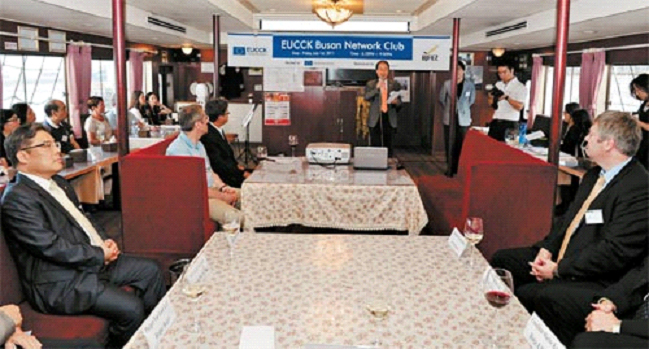
Market Information > Food News Clipping
Food News Clipping
July 06, 2011
2011.07.06
1. BILATERAL/MULTILATERAL ISSUES
[Viwepoint] Endgame for Korus[English, KJH]
The political cost to Obama of attempting to pass trade deals will increase rapidly and at some point become unbearable.
http://joongangdaily.joins.com/article/view.asp?aid=2938477
Full Text: Four years after striking an initial deal with
Obama¡¯s plan for Korus¡¯ ratification, however, is a high-stakes political gamble in an enormously complicated political environment.
After trying for months to forge a bipartisan consensus on the ratification, Obama has changed course and opted to try to push Korus through Congress in tandem with other controversial trade legislation. To succeed in this gamble, Obama must overcome a number of immediate challenges under great time pressure.
The principle challenge is the renewal of Trade Adjustment Assistance (TAA), a program that provides benefits to
A second challenge is the linkage of Korus to pending FTAs with
Additional challenges relate to the so-called fast-track rules governing the submission of the trade deals to Congress. These rules provide, first, for informal reviews of draft legislation by both houses of Congress and permit members of Congress to propose amendments. While the president does not need to accept the amendments in the final version of the bill presented to Congress for passage, amendments proposed during the informal process signal Congressional concerns.
The many amendments proposed for Korus, or at least those made public to date, indicate a high level of controversy and are previews of the heated debates to be expected in Congress about the legislation. They will also be used by opponents of the president¡¯s strategy as drags on the process. Furthermore, Republicans insist that the pairing of the TAA renewal with the Korus legislation is inconsistent with fast-track rules.
Timing is also a key concern for the White House. The November 2012 presidential election is coming fast, and the democratic base - already wary of trade deals and disappointed with Obama¡¯s inability to revive the
There is little that
The weeks ahead will show whether he can succeed in his audacious gamble.
*The writer is a senior partner at the law firm of Akin Gump Strauss Hauer & Feld LLP in
Korea-EU FTA celebrated in Busan[English, KJH]

Full Text: The Busan-Jinhae Free Economic Zone Authority (BJFEZ) supported the European Union Chamber of Commerce in Korea (EUCCK) Busan Network Club event held on July 1 on board the Nurimaru Cruise Ship. The event was to celebrate the Korea-EU FTA that came into effect that day and to strengthen the network between the members of EUCCK for increased investment.
There were 50 EU businessmen at the event, including Pleiger Far East LCC CEO, Roger Boger. All those present commemorated the Korea-EU FTA in front of Gwangan Bridge and through one-to-one exchanges between EU members and BJFEZ staff they promoted the Myeongji and Ung-dong regions along with a development path for BJFEZ, which aims to become a 21st century global hub.
In addition to greeting the Korea-EU FTA era, the event explained the general investment environment of BJFEZ as an outstanding location and incentives of its regions that are currently for sale or in development to raise awareness and interest of BJFEZ among European companies.
BJFEZ Commissioner, Ha Myeng-keun celebrated the Korea-EU FTA onboard the Nurimaru with Busan¡¯s famous
The event was to attract European companies since business between the two has become more active with the implication of the Korea-EU FTA.
2. ECONOMIC ISSUES
Trade deficit with
http://joongangdaily.joins.com/article/view.asp?aid=2938380
Full Text: Korea¡¯s trade deficit with Japan fell in the first half compared with a year earlier mainly because exports by Asia¡¯s fourth-largest economy benefited from Japan¡¯s devastating quake in March, data showed yesterday.
The government said a rise in
Compared with a year earlier,
In the first half,
Meanwhile,
3. MARKETING ISSUES
Hypermarket Stores Offer Imported Fresh Tropical Fruits [Korean, OSY]
http://economy.donga.com/total/3/01/20110706/38572311/3
Summary: Hypermarket chains are reportedly putting efforts to offer imported fresh tropical fruits. E-Mart has brought in 30 tons of fresh mangosteen in June from
The information in this report was compiled by the Agricultural Trade Office (ATO) at the U.S. Embassy in Seoul, South Korea. The press summaries contained herein do NOT reflect USDA, the U.S. Embassy, or other U.S. government agency official policy or view point. U.S. food exporters can learn more about market opportunities in South Korea by reviewing ATO Seoul¡¯s Exporter Guide and other reports available at www.fas.usda.gov by clicking on ¡°attaché reports¡±.
Agricultural Trade Office, U.S. Embassy - Seoul
Tel: 82-2-6951-6848 Fax: 82-2-720-7921
Email: atoseoul@state.gov